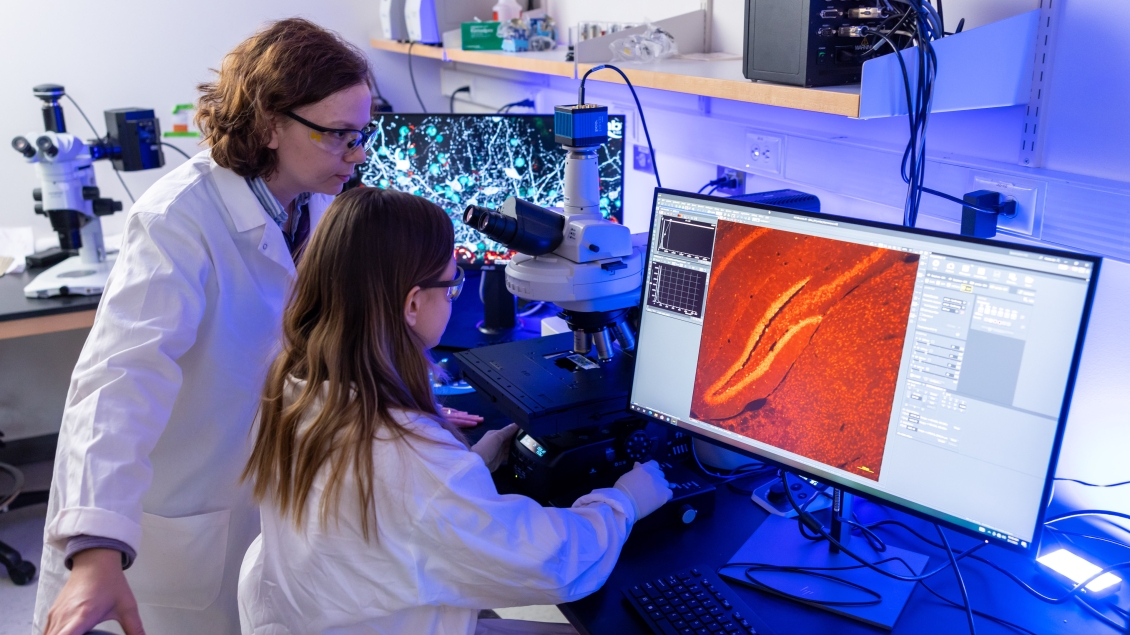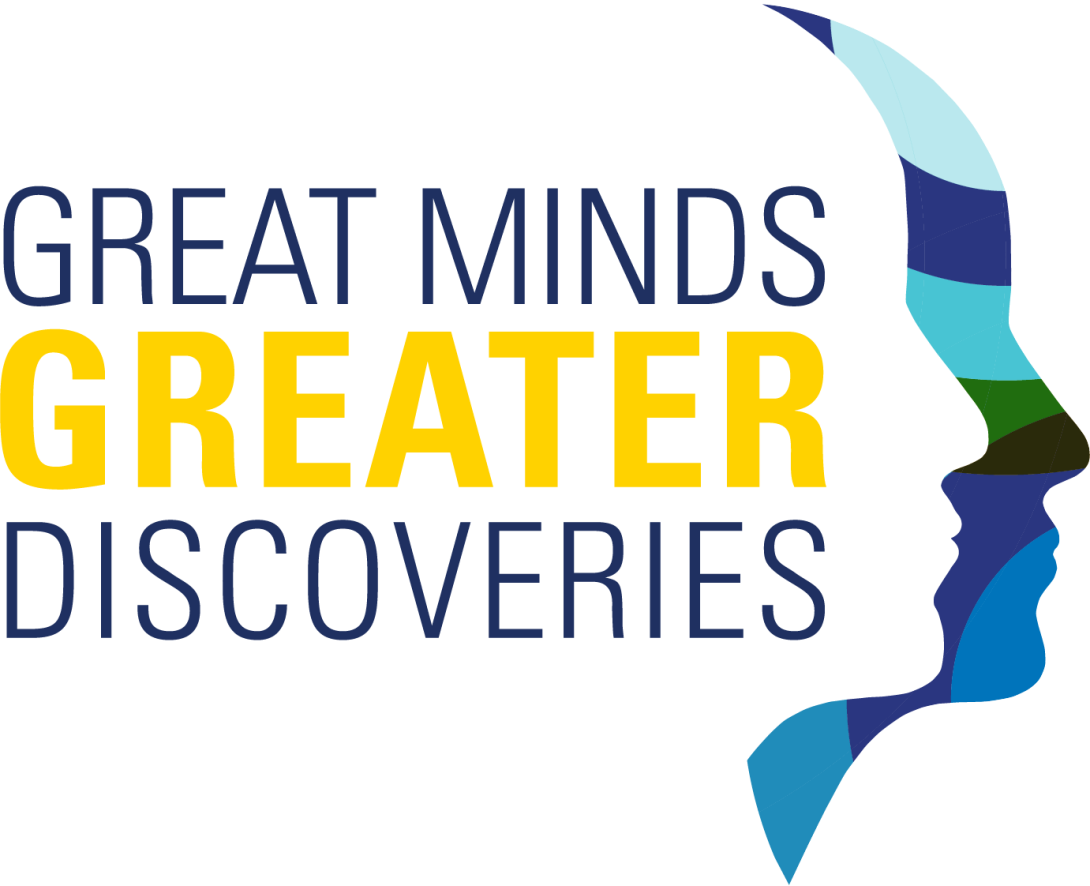
Strategic Research Plan
Focused on increasing faculty competitiveness and their ability to pursue major scientific questions in a rich and diverse environment, leading to discoveries that inspire new preventions, treatments, and cures.

The University of Michigan Medical School’s strategic research plan, Great Minds, Greater Discoveries, is focused largely on our people, who remain our greatest resource.
Shaped by the Research Board of Directors, the ultimate objective of this initiative is to increase faculty’s competitiveness and their ability to pursue major scientific questions in a rich and diverse environment that leads to discoveries that inspire new preventions, treatments, and cures.
eHealth is a strategic priority for Great Minds, Greater Discoveries, and to date the Office of Research has supported this domain through the creation of the Data Office for Clinical and Translational Research, investments in partnership with other campus collaborators in Precision Health, and the implementation of e-HAIL with the College of Engineering. Further eHealth planning will engage these and other existing programs across campus to focus on the strategies and resources needed to take Michigan Medicine research activities to the next level and synergize with the health system through translational efforts.
To better understand our research strengths, resources, and assets in eHealth, an Office of Research task force is gathering input from leadership and faculty working in AI, machine learning, wearables, sensors, big data, data analytics, predictive algorithms, and related fields. Subsequent phases will define priorities and prepare recommendations to help faculty navigate available resources and accelerate the pace of achieving impact in healthcare through translational research.
Interested in offering your feedback to the eHealth task force? Connect with Joan Keiser at [email protected].
The University of Michigan Medical School will be the destination for world-class research faculty, learners, and staff with active development across all stages of their careers. Tactics including:
- Support for Outstanding Research (SOAR)
- Pandemic Research Recovery Program
- Research Climate Council
- Professional Development
-Programs for each faculty career stage
-Clinical Research Coordinator career ladder
-Postdoctoral fellows salary policy – NIH level
-Evaluate research technical staff career bands
-Endowment to support graduate student training
-Coordination & support for physician scientist training
-Develop pipeline programs – student – faculty
-Research, Operations, Management & Strategy Fellowship - Expand Resources and Tools to Cultivate Competitiveness
-Establish a central training grant office
-Faculty on-boarding tool with Faculty Development
-Update proposal sampler
-Update boilerplate language (DEI, data management, etc.)
-NIH Other Support assistance
-Large grant support
-Release Discovery module for Michigan Experts
An integrated research ecosystem will foster collaborations across disciplines, the University, external partners, stakeholders, and communities. Tactics including:
- Identify scientific areas where the power and synergy of U-M can be brought to bear to advance science and health
Strategic Research Domains
-Neuroscience
-eHealth
-Health Equity
-Opioids & Pain
-Inflammation
Crosscutting Themes
-Interdisciplinary Collaborative Science
-Health Disparities
-Lifespan
-Translation to Impact - Provide large-scale grant support
- Develop a mechanism to facilitate organic community formation by faculty with common research interests
- Enhance Michigan Experts
Our pioneering research will enable innovative, high-risk, and transformative biomedical discoveries. Tactics including:
- Dedicate internal funds to support “bold” science. CLICK HERE to learn more about Research Scouts, one example of programs supporting bold science.
- Develop mechanisms to bring diverse faculty together intellectually to solve scientific and health problems
-Think tanks, ideation jams, TEDx, coffee chats, pubs & grub, Center-2-Center
-Foster an entrepreneurial ecosystem to advance novel findings and translate discoveries
-Capitalize on commercialization & seed funds to accelerate MM innovations
-Recruit faculty with an entrepreneurial phenotype
The U-M clinical research enterprise will be best in class, executing investigations of the highest quality and impact that improve clinical care, value, access, and outcomes. Tactics including:
- Improve efficiency of activating high-quality clinical trials.
- Build capabilities to become lead site of multi-site clinical trials.
- Execute “site-less” clinical trials using modern smartphone and web app tools
- Streamline processes
- Modernize regulatory review workflows & eRRM application
- Improve inpatient research workflows & partnerships
- Expand tools: Advarra eReg, recruitment, etc.
- Expand research to strategic ambulatory clinics & statewide community affiliates
Our vibrant research environment will facilitate scientific excellence through cutting-edge infrastructure and expert services. Tactics including:
- Strengthen IT infrastructure
-Embedded research liaisons
-Expand Academic IT core
-Managed device program
-High-speed research network
-Computing package
-Data storage, security, & dissemination
-Access to health data
-New tools: Salesforce (centralized training grant data) & Epic reporting and recruitment tools - World-class Cores & resources
-Continued technology investments
-Transforming cores - Advanced Microscopy & Advanced Genomics
-New central cores: Mobile Health & Wearables Collaborative & Training Grant Office
-Michigan Research Cores portal
-MM integrated website redesign – "Research” breadth and depth - Renovations & Improvements
-Generator Projects
-BSRB Vivarium
-Med Sci I B & D Wing
-Med Sci II
Keynote
Anticytokine Autoantibodies: Hiding in Plain Sight
Steven Holland, M.D.
Director of the Division of Intramural Research
National Institute of Allergy and Infectious Diseases
Presentations
When Inflammation Hides in Plain Sight
J. Michelle Kahlenberg, M.D., Ph.D.
Keratinocyte-Macrophage Inflammation Axis in Diabetic Wounds
Sonya Wolf-Fortune, Ph.D.
Immunopathogenesis and Immunity in the Lung
Bethany Moore, Ph.D.
Panel Discussion
Inflammation: Friend or Foe?
Steven L. Kunkel, Ph.D.
Nicholas W. Lukacs, Ph.D.
Maria Castro, Ph.D.
Weiping Zou, M.D., Ph.D.
Steven Holland, M.D.
With great minds achieving greater discoveries, we will create transformative knowledge that advances science and improves health.

1301 Catherine Street
Ann Arbor, MI 48109-5624
North Campus Research Complex (NCRC)
Building 520, 3rd Floor
2800 Plymouth Road
Ann Arbor, MI 48109-2800